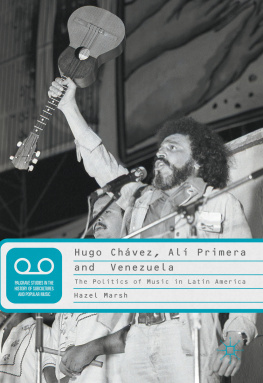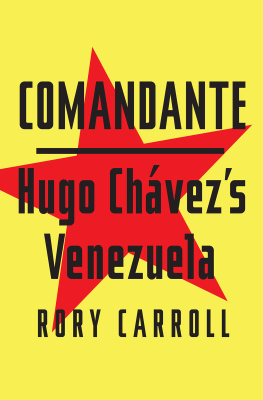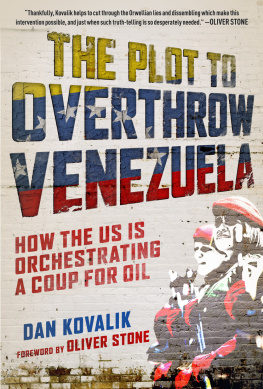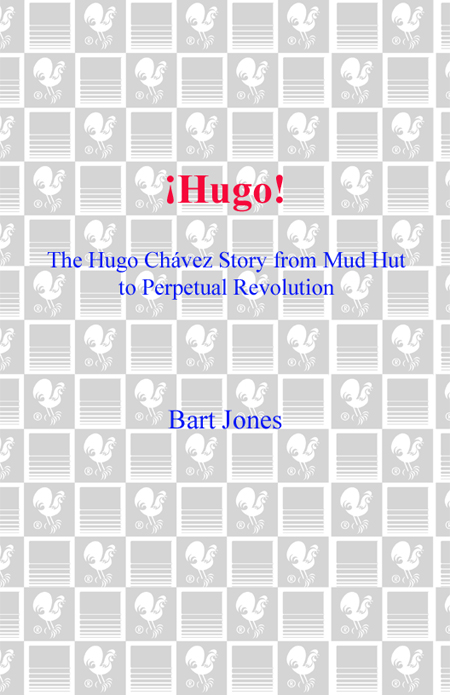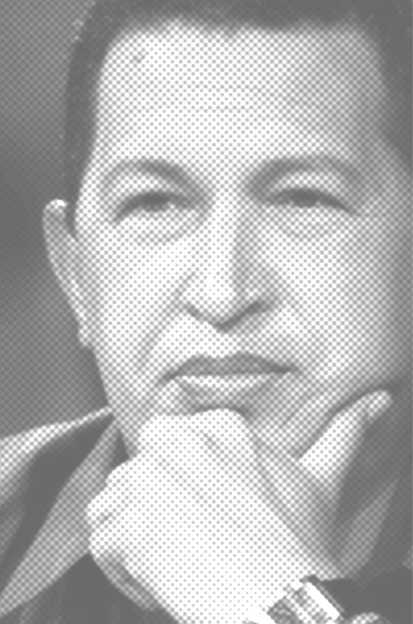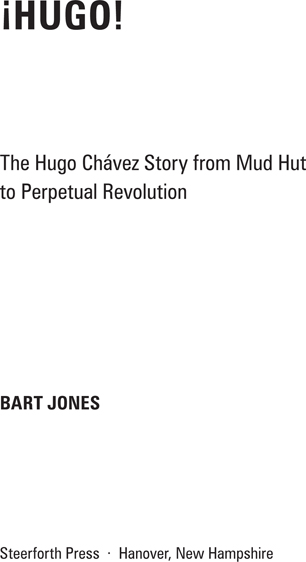Preface
Hugo Chvez and I were sitting alone on the second floor of the Miraflores Presidential Palace in Caracas, Venezuela. It was close to midnight on April 30, 2007. Venezuela was minutes away from making a small bit of history by taking majority control of four multibillion-dollar oil projects in the eastern Orinoco River basin from international companies, including ExxonMobil, Chevron, Conoco, and Total.
Chvez was overseeing the takeover from a table on a semi-enclosed outdoor patio. A thatch roof provided shelter. Several birdcages hung from it, and the birds occasionally chirped. It was tranquil. But in eastern Anzotegui state, things were hardly placid. The situation was electric. Workers and executives from the state oil company, Petroleos de Venezuela ( PDVSA ), accompanied by Venezuelan troops, were to take control of the private oil companies installations at the stroke of midnight on May 1, International Workers Day. Workers would hoist Venezuelan flags and change the names of the companies. Sincor, for instance, would become PetroJunin, named after a famous battle in Peru that had been led by Chvezs hero, Simn Bolvar.
Like many of Chvezs moves, the oil takeover was controversial. His detractors claimed it was another step in creating a totalitarian dictatorship modeled after Fidel Castro, his mentor. His supporters responded that he was proudly re-establishing national sovereignty over a strategic natural resource that had been exploited for years by foreign companies enjoying a virtual tax holiday.
I had a privileged view as Chvez coordinated the takeover. We were alone on the patio from 11:10 P.M . to 1:30 A.M . prime time for the president. It was my second interview with him in two days a rare opportunity to spend time with a man flooded with interview requests.
No one interrupted us save an attendant in street clothes who came in from time to time to ask if we wanted a cup of coffee or a glass of water.
The previous night I had flown back with Chvez on the presidential jet from the city of Barquisimeto to Caracas, interviewing him in his private office in the plane. Then he invited me to drive up to Caracas in his car, and finally took me for a short walk outside Miraflores.
Now, as midnight approached, Chvez got on his cell phone with Rafael Ramrez, the head of PDVSA . The president wanted to know which companies had not signed the contracts agreeing to turn over control to Venezuela. Conoco was the only company holding out, Ramirez told him.
A small television was attached to the thatch roof, and Chvez was keeping one eye on it. The president of the state television network was talking live on the screen from Anzotegui, declaring that the country was about to witness a historic moment. It would be good if you could make a statement to the country at twelve on the dot, maybe in a cadena, Chvez told Ramirez, using the word for a legally mandated broadcast all networks were required to pick up. Call Willian Lara, the communications minister, Chvez said. No, Ill call him right now. Let me order a cadena from here. Dont speak very long. Not like Chvez, he joked.
Within a few minutes Ramirez was speaking live on nearly every television station in the country. Chvez flipped the channels to make sure all the stations were complying. When he came to Channel 2 RCTV, he paused. The station was to lose its license to broadcast on May 27 and was engaged in a vigorous international campaign to denounce Chvez for crushing freedom of speech. The government contended that RCTV played an active role in a 2002 coup against the president, and its activities such as journalists and politicians declaring on television that the president should be overthrown would never be permitted in the United States. The Federal Communications Commission would have shut it down instantly. Nevertheless, when RCTV later did go off the air after the government refused to renew its license, Chvez came under worldwide attack; everyone from US Secretary of State Condoleeza Rice and President George W. Bush to human rights and free press organizations denounced his actions.
Chvez was pleased when he saw RCTV complying with the cadena. So they get even angrier, he said, laughing as he imagined the reaction of RCTV executives being forced to broadcast the cadena.
Ramirez spoke on television, and everything seemed to be proceeding smoothly. The PDVSA head ceremoniously gave an oil worker a red helmet the color of the Bolivarian Revolution to replace his blue one. The crowd in Anzotegui cheered wildly.
Getting to sit next to Hugo Chvez as he commanded the takeover was not easy. His aides told me in April 2007 theyd been flooded with more than a thousand requests for interviews since January. Some said the best I could hope for would be a couple of quick questions in a hallway somewhere. In the process of researching this book, I spent nearly two years lobbying officials to be able to sit down with Chvez to discuss his life and his presidency. Many said they would do what they could and then nothing happened.
It was a far cry from when I lived in the country from 1992 to 2000, covering the ups and downs of Chvezs rise to power. I had interviewed Chvez a number of times, and stood not far from him on an outdoor terrace the night he won the presidency in 1998. Yet before his triumph, Chvez at times practically had to beg for media coverage. Once, when he returned from a trip to Colombia and called a press conference, only a few reporters showed up.
Now, in early April 2007, my break finally came or seemed to, anyway. Government officials called me in New York to tell me the interview with the president was all set. Wednesday, April 25, would be the day.
I flew down a couple days early, showed up at the palace on the appointed day and got stood up. Se complic la cosa, I was told things got complicated. He couldnt do it.
Disappointed and miffed, I decided to take advantage of the day off by interviewing the two most powerful men in the government besides Chvez his brother Adn and his longtime vice president, Jos Vicente Rangel, who had recently stepped down from his post. Government officials assured me they were doing everything possible to get me in to see the president the next day.
The following day, nothing happened at least not until 3 P.M . By then I had given up hope and was mentally preparing to proceed with my scheduled flight back to New York the next day. But then a Miraflores aide called and informed me Chvez wanted me to accompany him on the presidential jet to Barquisimeto for a meeting with Bolivian president Evo Morales and Nicaraguan president Daniel Ortega, among others. I would be able to interview the president in the plane on the way back Sunday, or on Monday morning in the palace.
That Saturday morning we headed to Barquisimeto on the presidential jet. Only Chvez wasnt aboard. He missed the flight on his own airplane, which took some of his ministers, media people, security agents, and me to Barquisimeto, then turned around and went back to Caracas to get the president. I didnt talk to Chvez during the weekend he was busy tending to Morales, Ortega, and others.






